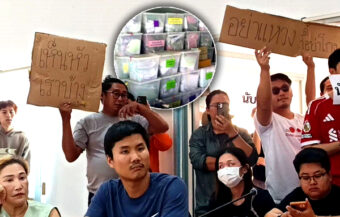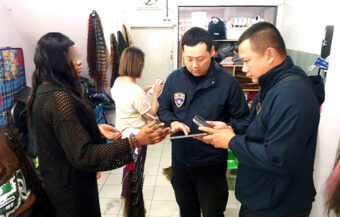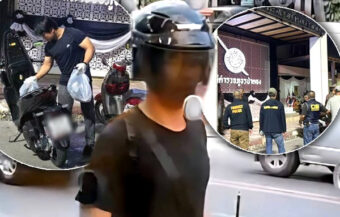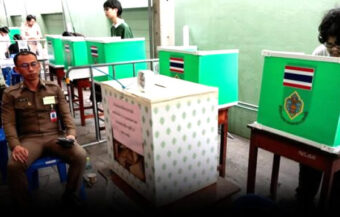Another wake-up call for Thai authorities as illicit scam centres on the Cambodian border enslave thousands, forcing brutal labour, torture, and killing young workers like 26-year-old Suda Chonlaket. The news exposes a growing pattern of deaths and abuse.
Illicit scam-centre operations appear to continue running openly across the Thai–Cambodian border. However, the situation is becoming more dangerous for the thousands of Thai nationals reportedly held as slaves inside these sites. The murder last week of 26-year-old Suda Chonlaket from Phang-nga is the latest warning to Thai authorities and law enforcement. The young woman was brutally tortured and died on Monday night, 10 November. Her death fits a growing pattern involving young Thai women in Poipet, a gangland hub on Cambodia’s side of the border.
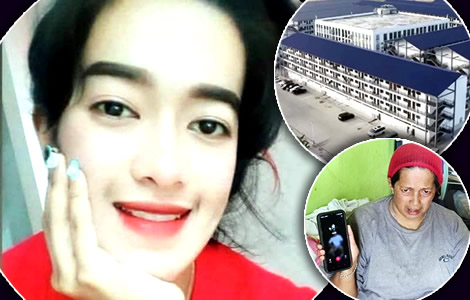
The family of 26-year-old Suda Chonlaket in Phang-nga province still wait for her body. The wait has now stretched into days. It began after her reported death in Cambodia last Monday night. Her partner in Chonburi first notified the family. This contact set off a rapid search for answers. The information was limited at the start. The family had no official confirmation from either country.
However, the family later received more details. These details described the final hours of the young woman. According to what they were told, she died in Poipet. Witness accounts linked her death to a scam centre.
These accounts stated she was forced to perform between 1,000 and 2,000 squats. She reportedly collapsed from shock and exhaustion. Then she was subjected to electrical shocks. She died soon after the attack.
Reports lead family to NGO that finds body and reveals over 100 Thais held with several recent deaths
The reports reached the family in separate fragments. Thai police could not confirm the death when asked. They provided no documentation. Cambodian authorities also gave no clear statement. As a result, the family turned to outside help.
The Immanuel Foundation, an NGO, responded. The organisation traced the body before cremation. Staff located it in a local facility in Poipet. They confirmed it matched Ms Suda’s description. They then informed Thai diplomats. The body was moved to Phnom Penh under embassy supervision.
Meanwhile, the NGO disclosed further information. It stated that Ms Suda had been held with about 100 Thais. These individuals were under the control of a scam compound director. The scam centre operates in a region notorious for the industry. Despite reports of Poipet and Sihanoukville being abandoned by the industry, the latest reports indicate that this was false propaganda spread by Cambodian sources.
Moreover, the NGO reported that at least five others in Ms. Suda’s group has died. All passed away recently. Some were murdered. These deaths occurred within months.
This case fits a rising pattern. Recent months have seen multiple deaths of young Thai women in Poipet. Many victims worked in connected enterprises. These included casinos, hospitality sites and scam centres. These operations form part of a larger commercial zone.
Regional scam zones expand into industrial fraud operations backed by foreign criminal networks
This zone spans entertainment, gambling and online fraud. It has grown significantly in the last five years.
Furthermore, similar centres have expanded in Cambodia, Myanmar and Laos. They started as entertainment venues. Later, they developed brothels and casinos. Then they shifted into online gambling. Eventually, they moved into industrialised online fraud. This evolution followed increased demand for cross-border scams. Many sites now run large digital fraud rooms. These rooms function around the clock.
The industry’s financing comes from foreign sources. Reports link the operations to Chinese mafia groups. Investors from China and Southeast Asia also take part. They provide capital for construction and technology. They also help manage logistics and staffing.
Scam operations depend on these resources. Workers are needed to run phones, computers and messaging platforms. Recruitment networks target Thai citizens. Many believe they are taking legitimate jobs. Others expect grey-sector work but not coercion.
Victims face strict control and violence as NGO blocks cremation and embassy secures transfer of body
However, victims often encounter strict control. Many centres restrict movement. Workers cannot leave without approval. Punishments occur when workers fall behind targets. These punishments include physical abuse.
They may also include confinement and resale of workers. Several victims have been transferred between operations. This movement complicates investigations.
In the case of Ms Suda, the discovered details show a sequence of forced labour and violence. They also show rapid attempts to remove the body. The Immanuel Foundation intervened before cremation.
This intervention preserved essential evidence. It also allowed the family to claim the body. The NGO said the body was already in preparation for cremation. Staff acted quickly to stop the process.
After this, the Royal Thai Embassy stepped in. Embassy officials supervised the transfer to Phnom Penh. This step ensured custody and documentation. The family were informed at once. They prepared for the return. However, they still lack a full official report. No authority has released a verified timeline. The family rely entirely on accounts conveyed to them.
Rising disappearances in Poipet prompt warnings as NGOs track growing abuse of Thai workers in centres
Poipet remains a focal point for regional trafficking and scam activity. The border zone draws workers from Thailand and other countries. Many enter the area after receiving job offers. These offers often involve hospitality or service positions.
Once inside, some workers are moved to scam centres. These facilities operate behind closed doors. Security guards monitor buildings. Entry and exit points remain controlled.
Furthermore, several countries have warned citizens about the area. These warnings reflect rising disappearances. They also reflect reports of deaths under unclear circumstances. Some victims vanish before relatives can contact them. Others contact family only once after arrival, then go silent. In many cases, the silence ends only when NGOs intervene.
The Immanuel Foundation has tracked several such cases. It reports increasing numbers of Thai victims. Many contact families from inside centres. In brief, they plead pitifully for help. Captured Thai citizens, reduced to slavery, describe physical abuse. They also describe targets they must meet each day.
Some say they cannot leave even when sick. Workers who resist orders face violence. The foundation states that five or more deaths have occurred recently among the same captive group as Ms. Suda.
Discovery confirms death and cremation attempt as family waits amid growing threat of scam networks
The organisation’s discovery of the body provides the clearest detail so far. Firstly, it again confirms death in the region. The story highlights a rush to cremate the bodies of victims. Significantly, confirms Royal Thai Embassy involvement in trying to mitigate the outages. The details obtained in this case have given the family a timeline.
For instance, they now know she died after forced squats and electrical shocks. They know she was held with others under a scam network. In addition, they know at least five others died in similar circumstances.
By any measure, this is a warning and a cry for action.
The family still wait at home in Phang-nga. Ms. Suda’s loved ones remain in regular contact with embassy staff. They expect the body to arrive soon. Presently, they also expect further clarification. Officials in Thailand have not released more information. Cambodian authorities have also remained silent. Communication continues mainly through the NGO and informal contacts.
The case brings home the expanding risks in the region. The shocking story highlights the rapid growth of scam centres and outrages linked with the menace. Certainly, it highlights repeated deaths. It spotlights the continued movement of Thai workers across borders. Undeniably, this is a poor reflection on the state of Thailand’s lacklustre economy. Indeed, the industry has reshaped border areas in the last five years, both in Thailand and Cambodia.
Expanding scam operations gain durability as families face delays and cremation risks across borders
Its scale has increased. Its structure has hardened. It now runs large buildings staffed by hundreds. These buildings host casinos, entertainment facilities and online fraud operations.
The financial strength behind these centres provides durability. Chinese mafia groups supply funding. Private investors support infrastructure. These investors benefit from the profits of online fraud. The operations continue even after raids. Workers continue to be moved. Recruitment continues across Thailand.
Meanwhile, families affected by the centres face long delays. However, they must depend on foreign agencies. Basically, they depend on NGOs. They depend on embassy coordination. When victims die, their bodies pass through foreign jurisdictions. These transfers take time. Documents must be approved. Embassies must intervene. In some cases, bodies are cremated before families can act.
The case of Ms Suda reveals these barriers. Her body reached a cremation site before discovery. Without intervention, it would have been destroyed. The timely arrival of the NGO altered the process. It allowed a transfer to Phnom Penh. The current wait reflects the remaining procedures required.
Family awaits report as authorities review case of Thai woman who died after forced exertion in Poipet
Authorities in both countries may provide statements later. The family will receive the formal report once available. Until then, the known facts stand. A 26-year-old Thai woman died in Poipet. She collapsed after forced physical exertion.
Ms. Suda later died after receiving electrical shock punishment. She was held with around 100 other Thais. At least five others in that group have died recently, according to intelligence. Her body was nearly cremated. It was removed under embassy supervision. Her family now waits in Phang-nga for her return.
Battle with scammers rages within Royal Thai Police as Big Joke continues fight against alleged corruption
Evil and misery caused by scam centre compounds in Myanmar and Cambodia must be urgently lanced
Family, bank and police intervention save a 79-year-old grandma from losing ฿3 million more to scammers
This case remains part of a wider pattern. The pattern involves scam networks. It involves the deaths of Thai workers. After that, it involves repeated abuse. It involves the rapid expansion of cross-border fraud zones. Certainly involves organised funding by both crime groups and wealthy Southeast Asian investors.
Finally, it involves ongoing risks for Thai citizens. Further developments depend on official confirmation, but one thing is for sure. This monstrous evil represents everything that is wrong with human society and morality in this part of the world.
Join the Thai News forum, follow Thai Examiner on Facebook here
Receive all our stories as they come out on Telegram here
Follow Thai Examiner here
Further reading:
Evil and misery caused by scam centre compounds in Myanmar and Cambodia must be urgently lanced
High powered, secretive meeting chaired by PM agrees robust action against Cambodian networks
Thailand and Cambodia face danger from ‘Dragon Head’ the Chinese mafia leader behind the scams
Cyber police and Money Laundering agency seek UK and US co-operation targeting Cambodian networks
United States, South Korea and United Kingdom act against Cambodian scam industry with Thai tie-ins
Ben Smith affair & allegations of links to Cambodian scam centres continues to rage in parliament











